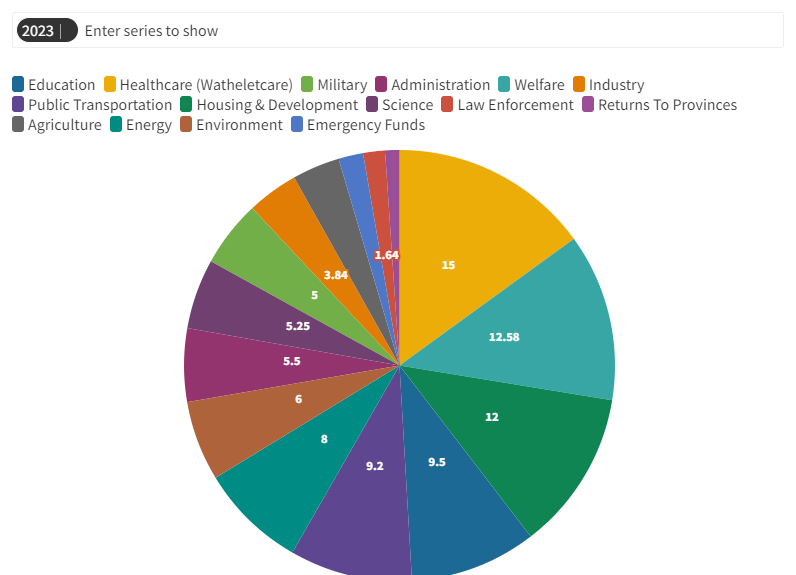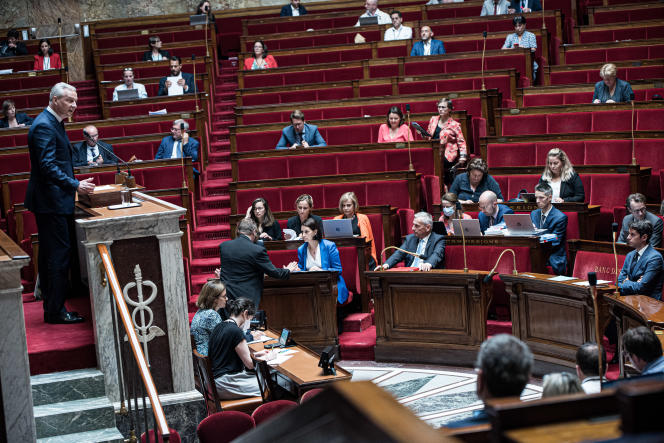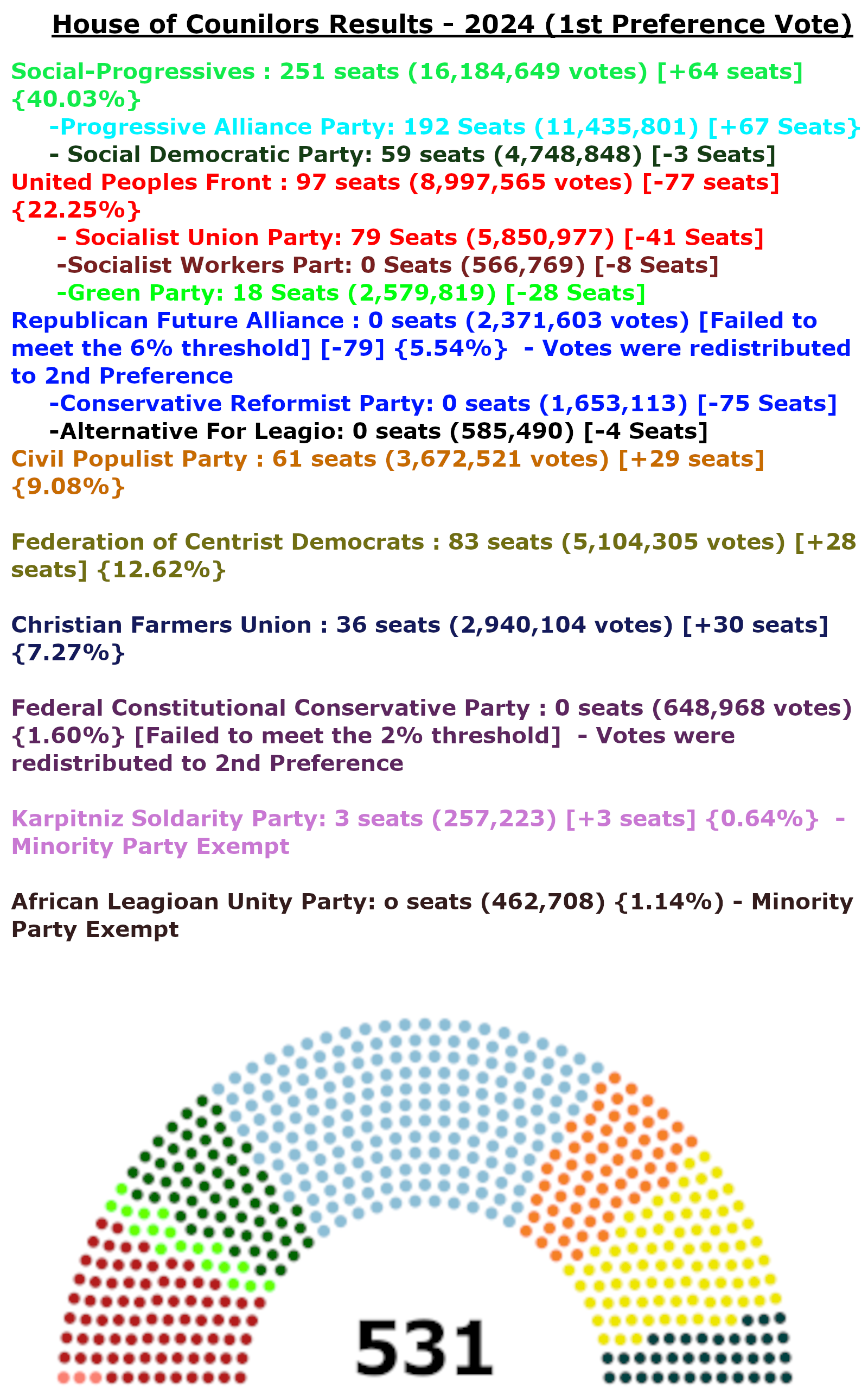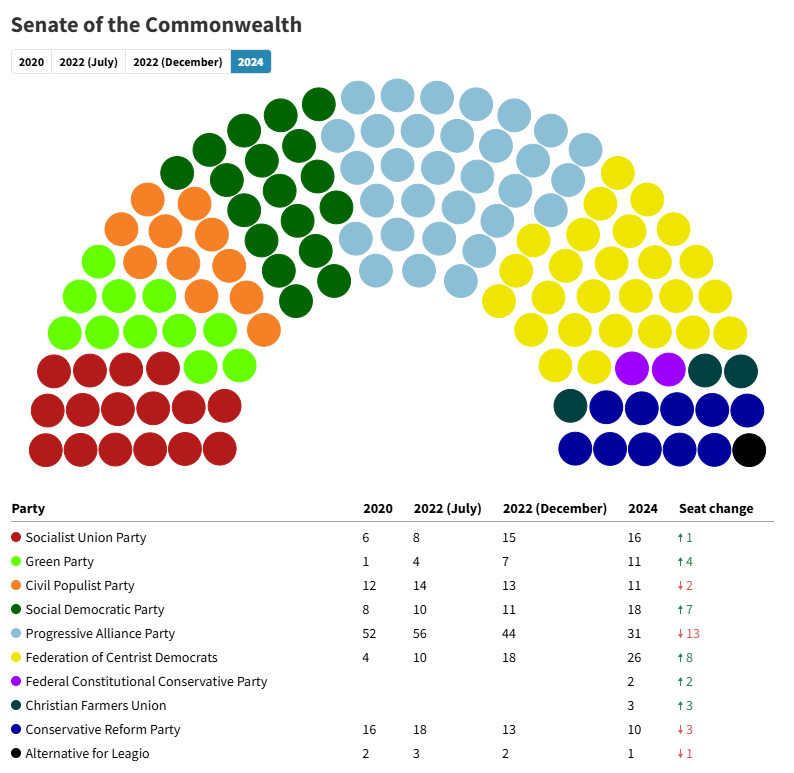Leagioan News Agencies
-

Civil Populists in Trouble and leave Republican Future Alliance

Not long after the start of the first session of the newly elected National Congress, Chairman and Councilor (Former Governor-General) Mark Gorge stepped down as leader of the Civil Populist Party after its poor performance in the recent National Congress election in December, where said party lost 56 of the 88 seats that it gained back in 2020. The Party had performed so poorly in this election that in a election with a much larger electorate than in 2020, the Civil Populists actually lost about 600,000 which made its defeat more certain and was the cause for the scale of its embarrassing defeat. When polls were conducted as to why the Civil Populists lost so badly this election, many respondents said that it was because of the parties shift to more rightward positions and it being the cause of Mouri-Kudo being unable to govern efficiently.Inside sources said that many members of the Party feel that the future of said party is at risk of collapse and irrelevant due to its positions as well as its recent history. In addition, many members of the Civil Populists in the National Congress suspect that most of the seats and votes that they lost were of the former Left-Wing factions of the party that either went to the Social Democrats and the United Peoples Front Alliance in opposition to the party’s alliance with the Conservative Reformists and Christian Democratic-Republicans. On January 2nd, the Civil Populists temporary leadership committee with its members voted to the leave the Republican Future Alliance by 84% majority. On the same day, the leadership committee also held an election to elect a new chairman for the party itself through the method of instant runoff. Eventually, by the third round, the Party membership choose the famous Senator representing Gopen and Former Internal Affairs Commissioner Candidate Maria Kerstin to lead the party through its uncertain times.
Maria Kerstin was recently re-elected to be Senator for the party in Gopen within a safe margin as the Party did not suffer as much in the Senate side of the election by losing only 1 Senate seat. During her speech for the chairman election, Senator Kerstin said that if elected “she would rebuild the trust and relationship that the party once had with the people by going back to the party’s founding roots back in 1907 where it shifted its stances based on the needs of the people through petitions and sit-ins with the citizens of the commonwealth where it once had the name of the ‘Party of the People.’”
-

National Congress Complete New Budget for 2023
After much deliberation with the Lahaye Government and suggestions by President Mouri-Kudo, re-elected Speaker of the House Shinichi Mouri-Kudo (First Gentleman and husband to the President of the Commonwealth) announced that a budget for the Commonwealth had been agreed upon and passed through the House of Councilors through the needed means provided within the Constitution. In the budget, there was many changes that were put through focusing on areas that the Lahaye coalition government wished to be a priority of the Common Government this year at least. The industry sector of the Commonwealth received a huge cut in funding in this budget from 126 billion Sulias to now 57 billion Sulias. The reasons for this substainal cut was back by the Lahaye government and Minister of the Economy and Treasury Tom Kelly in that the industry of Commonwealth has already shown tremendous growth, but now the people need help not big business. Meanwhile, the percentages of other sectors might have been reduced but their budgets compared to last year have not by much at all.

However, the areas that received an outstanding increase in budgets were Healthcare, Housing & Development, and Welfare. For example, in last years budget, the healthcare sector had a budget of just 84 billion Sulias but now it has been dramatically increased to have a budget of at least 223 billion Sulias or 337 billion Euros. Prime Minister Lahaye, during a round of question by the leading opposition party, the Conservative Reform Party, explained that the need of the large increase in healthcare was a means of not only modernizing the healthcare system of the Commonwealth but also to improve the living of Leagioans in the medical support that they received. Many experts agreed that the large increase in healthcare is Lahaye’s steppingstone to nationalizing the health system of Leagio.After debate, a vote was held on the budget with all the government majority of 361 voting in favor of the budget with 172 Councilors in the Opposition voted against the budget, while the opposition from mainly the Conservative Reformists and Christian Democratic-Republicans of 83 voting against and many of the Civil Populists voting against the budget due to disagreements on the need to provide much large spending to energy.
In addition, the budget included the following provisions that were made law for various ministries this year:
• The Ministry of Defense and Ministry of Research shall invest in research as well as develop on drone technology and hypersonic missiles.
• Ministry of Agriculture shall provide agricultural investment on additional subsidies to small farms and farms that are environmentally friendly.
• Ministry of Public Works shall provide additional funding to the rail-line from Tullion to Tokyo and classify it as a top priority project
• Ministry of Social Services shall provide monthly subsides of about 150 Sulia’s to families at or below extreme poverty for living needs
• Ministry of Social Services in coordination with the Ministry of Education shall provide a free school-lunch program to needy schools in the states in Eastern sector of the Commonwealth.
• Ministry of the Environment shall spend at least 5% of its budget for environmental rebuilding programs.
• The Ministry of Education shall provide grants to the construction to 5 schools and a university in Project Wayside
• The Ministry of Education shall spend 3% of its budget on student loan forgiveness.
• The Ministry of Cultural Affairs will introduce a job employment program and training program for minorities that are unemployed for longer than 3 years
• The Ministry of Housing and Development shall spend at least 5% of its budget for the construction of new housing projects in the states of Loors, Kyiv, and Fiowa for the year.
• The Ministry of Research and the Ministry of the Economy & Treasury shall coordinate investment on a program that shall make multi-currency use in stores simple.
• The Ministry of Public Works shall develop a blueprint plan for renovating the capitol sector for residence of the Prime Minister and the new Ministries of the Commonwealth by the end of the year. -
 _
_
Navy Purchases Ships From the United Kingdom
Last week, Prime Minister Lahaye announced that her government was able to secure a deal that was weeks in the making with the United Kingdom as part of a step to modernize the Leagioan Navy. The move comes part of the coalition agreement to modernize the military of the Commonwealth with new equipment and additional focuses on research such as Drone technology and hyper-sonic missiles. The government of Commonwealth in a agreement with the Starmer Government in the United Kingdom, the two countries would work together in developing a new class of frigates and destroyers as well as new drone. As part of a iniative to begin the process of modernizing the Leagioan Navy in particular, the Commonwealth purchased licenses for the following the British Class of Type 45 Destroyers and the Type 23 class Frigates.

(A image of LNS Gopen taken as it sailed out of Port Hilson)

(A image taken of the brand new Alberto Malillos sailing into Port Hilson)
The classes will have all the original British technology but modifications of some of the Leagioan counterparts of ASW detection and radar. The new classes will be named as according to the new ship naming conventions that President Mouri-Kudo authorized, which in this class the Type 45 Destroyers will be called the Gopen Class Destoryers and the Type 23’s are the Abel Ortiz Class Frigates. The Ministry of Defence announced that 3 of the new Gopen Class Destoryers were purchased from the shipyards of the United Kingdom (LNS Gopen, LNS Jullien, LNS Freedonia) and 5 Abel Ortiz Class Frigates were purchased as well (LNS Abel Ortiz, LNS Alberto Malillos, LNS Hyden Cole, LNS Louie Holland, and LNS Noah Valledres).
Lahaye Government Submits Bill for Nationalized Healthcare System
Prime Minister Lahaye with the support of Minister of Health - Mark Dime of the Green Party submitted a bill for a nationalized system of healthcare for the Commonwealth, where it is based on a multiple payer system of health where depending on the occupation, jobs would pay parts of it with the government of different levels of the commonwealth from Federal to local through taxes, and depending on the procedure it is paid by the patient unless it is necessary for the health and safety of the patient. The bill called the National Healthcare Act places all nurses, doctors, and medical personnel as employees of the Common government of the Commonwealth. Furthermore, the Act establishes a regulation that grants the creation of Bureau of Quality Health where it will provide price regulations. In addition, the bill would shift health insurance companies from selling insurance in general to selling benefits that would improve that would cover cosmetic surgery and other non-necessary procedures. The bill is expected to go through the Health and Social Services Committee within the House of Councilors before it goes through a official vote.
-

Federation of Centrist Democrats Aims to Empower Local Communities and Strengthen Fiscal Federalism
The Commonwealth of Leagio has witnessed the birth of a new political alliance called the Federation of Centrist Democrats. The formation of this alliance comes after the Leagioan Pact of Democracy (LPD) and the Hope for Leagio alliance joined forces to create a unified political front.
In the parliamentary election held in December, the LPD gained seats in the Senate but lost all of its seats in the House of Councilors and lost some hold in state legislatures within the Commonwealth. Many of the newly elected officials ran on a platform advocating for localism within their districts and states, indicating a shift away from non-partisan candidates.
Jordan Gauthier, the current president of the LPD, converted the party into an actual political party after realizing that the days of electing non-partisan candidates had long passed Leagio. The party congress ratified a platform that supports new federalism, giving more power to the states and local levels of government.
After adopting the new platform, the LPD began discussions with the Hope for Leagio political alliance (which includes the Free Democratic Party and the Eastern Leagio Party) to become members of the alliance. Senator Carlito Silvestre, the current president of Hope for Leagio representing Tullion, accepted the request and requested the Alliance Committee to consider a potential renaming of the alliance and a new platform that aligns with all members of the alliance.
The newly formed Federation of Centrist Democrats stands on a platform of localism, fiscal federalism, and classical liberalism. The Federation seeks to ensure that power is more evenly distributed between the central government and the provinces, while still allowing for local governments to have a say in the decisions that affect their communities. In addition, the Federation's commitment to classical liberalism means that they aim to limit government intervention in the economy while promoting individual freedoms and civil liberties.
However, there are concerns about the absence of any mention of foreign policy in the Federation's platform. Some political analysts have criticized the Federation's lack of a foreign policy stance, as they believe that it is essential for a country like Leagio to have a clear stance on international relations. They argue that in today's interconnected world, no country can afford to be inward-looking and ignore the global trends and events.
Despite these criticisms, the Federation of Centrist Democrats is expected to continue to grow in size and influence in the coming months. Many Leagioans are looking to the alliance as a new hope for a more prosperous and united future. Only time will tell whether the Federation's localist, fiscally federalist, and classical liberal platform will be successful in achieving its objectives and addressing the challenges facing the Commonwealth of Leagio.
-

Healthcare Nationalized By Congress
The National Healthcare Act, which was recently signed into law by President Mouri-Kudo, has caused a stir in the Commonwealth of Leagio. The new law aims to nationalize the healthcare service and establish a multiple-payer system. It is set to provide access to medical services to the 21% of Leagioans who currently do not have health insurance.The National Healthcare Act is the result of a bill presented by Prime Minister Lahaye and the Minister of Health, Mark Dime. The bill was widely debated in the National Congress, with arguments for and against it coming from both sides of the political spectrum.
Proponents of the bill argue that the current healthcare system is too expensive for many Leagioans and that the new system will provide affordable healthcare to all. They also highlight that the new law includes vision and dental aid, as well as mental health services.
Opponents, however, have voiced concerns about the potential cost of the new system and the impact it could have on private insurers. Some have also raised concerns about the quality of care that will be available under the new system. Leader of the Conservative Reformist Party in the House of Councilors, Councilor Kai Shina argued that the idea of nationalization the healthcare of the Commonwealth strains the budget of the government and takes away power from the states in running their own affairs. These lines are also similar to the Leader of the Federation of Democratic Centrists in the House, Councilor Furuse Mine, who argued that the bill should instead be forcing states to give away power of healthcare to the Common Government and at least offer grants to the Health Ministries in the Provinces to regulate the healthcare system to achieve more efficient results.
Despite these concerns, the bill passed through the National Congress and was signed into law by the President. In the House, the Government majority managed to pass the bill with all 361 Councilors voting in favor while the Conservate side of the House voted against with 140. The Civil Populists in Congress abstained in both houses, while the Senate quickly voted in favor of the Act by 77 Senators. The government has now begun the process of nationalizing the healthcare service in Leagio with Minister of Health – Mark Dime leading the way with the momentous task ahead that will take years to perfect and possibly by the time the task is complete a new government will be in-charge or the next election will take place.
The inclusion of vision and dental aid in the new law has been met with mixed reactions. Some have praised the move mainly those in supportive of the Lahaye Government, stating that dental and vision care are often neglected under traditional healthcare plans. Others that support nationalization healthcare such as the Civil Populist Party, however, argue that the inclusion of these services will increase the cost of the new system for something brand new being attempted within the Commonwealth.
Overall, the National Healthcare Act represents a significant change for the healthcare system in Leagio. It remains to be seen how successful the new system will be, and whether it will achieve its aim of providing affordable healthcare to all Leagioans.
-

KSP and ALUP Labeled Minority Parties
After the recent decision by the Common Electoral Commission (CEC), the African-Leagioan Unity Party (ALUP) and the Karptniz Solidarity Party (KSP) have been granted minority status for the upcoming elections in the list seat category.
This decision by the CEC means that the two parties will be exempt from the 2% voting threshold that is required for political parties to receive seats in the National Congress's House of Councilors. This is a significant victory for both parties, as they will now have a greater chance of representation in the government. The ALUP has been advocating for the rights of African-Leagioans for years, and the granting of minority status is a major milestone in their fight for representation. The KSP, on the other hand, has been working to raise awareness about the struggles of the Karptniz community and the need for greater support.
With the exemption from the voting threshold, the ALUP and KSP will be able to more effectively advocate for the issues affecting their communities, and their voices will be heard in the National Congress's House of Councilors. In addition, this recent decision by the CEC now means that the two parties will be receiving government subsidies to provide for the future success of their parties. This decision has been welcomed by many as a positive step towards a more inclusive and diverse government. The ALUP and KSP have expressed their gratitude to the CEC for their decision and have pledged to continue working towards the betterment of their communities.
In a statement, President Mouri-Kudo said, "I am pleased that the CEC has recognized the importance of ensuring representation for minority communities in our democracy. The granting of minority status to the ALUP and KSP is a step towards a more inclusive political system."
The leader of ALUP, Aisha Mbeki, expressed gratitude for the decision, saying, "This is a victory for the African-Leagioan community. We have long been underrepresented in the political sphere, and this recognition of our party as a minority interest party will ensure that our voices are heard."
Similarly, the leader of KSP, Jakob Wahalla, stated, "The Karptniz people have faced discrimination and marginalization for too long. This decision by the CEC is a positive step towards breaking down barriers and ensuring that our community has a seat at the table."
As the election of 2024 approaches, it will be interesting to see how this decision affects the outcome and whether it will inspire other minority parties to fight for their own recognition and representation.
-

Project Wayside Residents to Vote on Name for New City in Upcoming Referendum
In an unprecedented move, the State government of Arlick has announced that it will hold a referendum on the naming of the new city under Project Wayside during the upcoming EU-Commission Elections. The referendum will allow residents of Project Wayside to vote on the city's name, with options that include the names of New Belfast, Saint Beau, Valladares, Oko, or Masir.
This move has been praised by many as a positive step towards greater democracy and citizen participation in government decision-making. However, it has also been criticized by some who feel that the decision should have been made by elected officials rather than through a public referendum.
The results of the referendum will be determined through the use of the Instant-Runoff voting system, which allows voters to rank their preferences in order of preference. This ensures that the winning option is one that is preferred by the majority of voters. In addition to the naming referendum, the Arlick government has also announced that a non-binding referendum on statehood for Project Wayside will be held. This referendum is part of the coalition agreement between the Social-Progressives and Civil Populist Party coalition government in Arlick.
The Arlick government has expressed hope that the referendums will help to promote greater citizen participation in government decision-making and ensure that the needs and preferences of Project Wayside residents are heard and taken into account. The results of the referendums are expected to be closely watched by political observers both within and outside of Arlick.
-

National Congress Passes New Progressive Tax System
After debate and discussions that involved various agreements between members of Prime Minister Lahaye’s Coliation government, the National Congress was finally able to agree on the passage of a new tax system that would be more progressive and provide more equality of income between Leagioans. The bill that passed the National Congress, on March 27th, called the Progressive Tax Share Act introduced a tax bracket system that Leagioans would pay the Common government outside of the State or Territorial Income Tax that they would have to pay with their year income. The agreed upon brackets was something that had been in constant negotiation between members of the Lahaye Coalition Government and the Finance Committees in both Houses of the National Congress. The Act also included a list of new taxes that would be introduced that repealed or merged other tax acts that were passed since the founding of the Commonwealth. For example, the Progressive Tax Share Act was merged with the Negative Income Tax Act of 1982, where it provides to a people to spend freely as a stimulus if they are below the lowest tax bracket. In the case of the new tax act, the lowest bracket is where single people have to pay 0% of taxes if they make 10,000 Euros or 6,535 Sulias a year.
Tax Income Percentage bracket Income for Single Filing in Euros (Sulias) 0% <10,000 (6,535) 18.5% 10,001 - 29,451 (6,536 - 19,249) 24% 29,452 - 50,369 (19,250 - 32,921) 30% 50,370 - 82,781 (32,922 - 54,105) 33% 82,782 - 98,834 (54,106 - 64,597) 40% 98,835 - 131,625 (64,598 - 86,029) 46.5% 131,626 - 168,325 (86,030 - 110,016) 49% 170,526 - 250,025 (110,017 - 163,415) +2% over 250,026 (163,451) +5% over 500,000 (326, 797) Most of the taxes that were repealed were of the more of the Pro-Big Bussiness taxes during the Presidency of Alberto Malillos (1994-2000). In these taxes passed by Lahaye, the Captial Gains Tax, Corporate Tax, Excessive Profits Tax was raised by over 10 to 15% or in the case of the Excessive Profits Tax then a up to 38% increase. However, the Progressive Tax Share Act also included new taxes that were considered controversial by the opposition parties which were a Expatriation Tax for persons that wish to emigrate outside of the Commonwealth that to is also progressive with its highest rate being at 42.6% for person with a income of over 150 million Euros or 229.5 Million Sulias. Members in the Conservative Reform Party and in the more old-guard as well as conservative members of the Progressive Alliance Party (the party of President Mouri-Kudo and Prime Minister Lahaye) opposed calling it a move of attacking the free market of business within the Commonwealth. Some of the taxes that were implemented into the Act can even be raised to certain level by state governments when passing their own taxation legislation. Another complaint that was raised by the opposition, mainly those in the Conservative Reform Party, was the idea that the tax rates where too high of a burden on the population of the Commonwealth. For example, Councilor Tristan Fortier (also a member for the party in the House Finance Committee from where the bill started) argued that the flat tax rate that was started by President Mallilos provided more food to the table for poor working-class families of the Commonwealth. However, President of the United Peoples Front Alliance James Moriarty sent a retort on television yesterday during a conference with the Commonwealth Steel Workers Union by saying that "Councilor Fortier seems to have forgotten that the flat tax rate started by Malillos had hurt the eastern states or territories at the time as the Flat Tax Act prevented States and Territories from passing laws that allowed them introducing their form of a progressive system to pay for their governments, which had hurt the families of union workers and common citizens in the east as the flat tax did not account for lower-income situations." Moriarty had also made an additional retort in that the flat tax had actually made big businesses in the commonwealth stronger and have more power to the point that it require Mouri-Kudo to pass the Labor Union Civil Rights Act a couple of years ago.
Tax Type Rate Sales 2% (can go up to 6% by Provinces) Corporate 38.5% Payroll 3.4% (can go up to 5.1% by Provinces) Capital Gains 29.4% Expatriation 42.6% Excessive Profits 40% Alcohol 8.2% (can go up to 12% by Provinces) Vat 2% (can go up to 6% by Provinces) The Progressive Tax Share Act passed the National Congress where in the House of Councilors had 295 Councilors Approving the bill and 238 against the bill with some being from Mouri-Kudo’s own party; The Senate approved the bill with 73 Senators For and 50 Against it (with a couple too being from Mouri-Kudo’s Party). The Fact that some of Congressmen in the PAP have brought recent concerns that the Progressive Alliance Party is at risk of fragmenting and shattering the majority that the Lahaye government currently has. However, President Mouri-Kudo expressed reassurance that there is no sign of serious conflict with members within her own party. "Although, it is understandable that some might feel that there is fragmentations happening with the Party, " The President said in a conference with the press after signing the act yesterday, "but it is common for disagreement within the interiors of larger parties to occur. The party took their opinions but was unable to meet the needs of every member in both houses and so we have the results that we saw on the 27th of March. However, the members that voted against the party made reassurances that they had no intention to split with the party that they have benefitted from at this point. We will try to accommodate for them better in the future as a sign of understanding."
-


(MInister Tom Kelly at the annual Commonwealth Economic Forum last weekKudonomics: Bold Government Intervention or Recipe for Disaster? Congress Divided on Economic Policies
In a interview recently at the annual Commonwealth Economic Forum in Dilaton, Condris, Minister of the Economy and Treasury Tom Kelly explained that the economic policies that he termed as ‘Kudonomics’ have been driving the economy of the Commonwealth of Leagio to new heights. The 45 year-old minister and Councilor representing the southern eastern section of Gopen since 2003 backed his statement by illustrating how the GDP of the commonwealth has risen by 250% of what it was before the inauguration of President Ran Mouri-Kudo after two year period, where the Country has a strong economy that can efficiently compete against other European nations economically. When compared to the previous president of Kenith Lifejumper, the GDP has see more growth with yearly salaries rising by at least 30,000 Sulias. Furthermore, Minister Kelly stated that in his opinion the policies of Mouri-Kudo involving the implementation of a progressive tax system, focused attacks on reducing the power of big business, increased government spending as a way to increase GDP with development for eastern provinces, and the creation of a ethics code for business to follow was very effective and successful.
The term of Kudonomics has been on the rise in the commonwealth through social media lately that has helped to improve the image of the current president where it involves a level of government intervention in the economy that had not been seen since the days of President Maxime Gauthier, who implemented his New Deal program during the economic hard times of the 1950s. The level of intervention when compared to President Lifejumper in particular is more aggressive in where Mouri-Kudo and Lahaye implement large-scale government spending in infustrature that went above even Lifejumper’s Eastern Economic Development Act which had the spending of 4 billion sulias that were saved to improve the infrastructure of the eastern provinces during a time of economic uncertainty after the Commonwealth joined the European Union.
However, many members of the National Congress that are in opposition to the Lahaye Government argued by explaining that the increase spending had caused a large decrease in the savings and amount of disposable income that the common Leagioan has in their pockets while at the same time the cost of living within the Commonwealth has risen by a large amount as well, which will at some point in the future will come back and do even more damage to the economy that will reverse all the results and effort of the Lahaye government.
In response to especially from the criticism of Councilor James Hilda from Huttson and of the Conservative Reformistists (who made such comments in the floor of the House of Councilors during its weekly 2 hour period of debating the policies of the government and the President), Economics Professor of the University of the Commonwealth William Heasa explained that “although, increased cost of living may result in lowered disposable income for some Leagioans, which could have negative effects on consumer spending and economic growth in the long term. The benefits in the long-term will start to outweigh them in the future at an even further state.” Another comment of concern from members of Congress was that Senator Maria Kerstin, herself, who issued a statement of concern that these large scale and expensive development programs will lead to a level of Debt that the Government will probably need to burrow from the EU and other European powers in order to finance the programs and projects completion.
Professor Heasa continued to explain that the effects of Kudonomics in how the benefits will still out weight the costs in that:
• By focusing on development for eastern provinces, Kudonomics may help to improve infrastructure in those regions, which could have long-term benefits for the economy.
• The progressive tax system implemented under Kudonomics may help to reduce income inequality in the long term, which could have positive effects on social and economic stability.
• By implementing a progressive tax system and reducing the power of big business, Kudonomics may help to create a more stable economic environment in the long term. -

Ministry of Environment Launches Innovative Recycle Payment Scheme to Promote Sustainability
In a groundbreaking move towards fostering environmental sustainability, the Ministry of Environment has introduced a pioneering Recycle Payment Scheme aimed at incentivizing and rewarding individuals and communities for their recycling efforts. This initiative, a first of its kind in the Commonwealth, is set to revolutionize waste management practices and create a culture of responsible consumption.
Under the Recycle Payment Scheme, individuals and households will be encouraged to participate actively in recycling programs by providing monetary incentives for their recycling contributions. The scheme aims to motivate citizens to separate and recycle their waste effectively, reducing the burden on landfills and promoting the circular economy.
Through this scheme, citizens will receive a designated monetary value for each unit of recyclable material they properly dispose of, such as paper, plastic, glass, and metal. The Ministry of Environment will collaborate with local municipalities and recycling centers to implement an efficient tracking and reimbursement system. Participants will be able to claim their rewards through various methods, including mobile applications or designated collection points.
The Recycle Payment Scheme not only serves as a financial incentive for individuals but also fosters a sense of responsibility and environmental consciousness. By actively participating in recycling initiatives, citizens will contribute directly to the preservation of our natural resources, reduce greenhouse gas emissions, and combat the detrimental effects of waste accumulation on our ecosystems.
This initiative aligns with the Ministry of Environment's broader goals of achieving sustainable development and reducing the carbon footprint of our nation. The Recycle Payment Scheme aims to significantly increase recycling rates, thereby reducing the need for raw materials extraction and reducing the environmental impact associated with waste management.
The introduction of the Recycle Payment Scheme reflects a proactive and forward-thinking approach by the Ministry of Environment. By encouraging citizens to play an active role in waste reduction and recycling, the scheme aims to create a paradigm shift towards a more sustainable and environmentally conscious society.
The Ministry of Environment invites citizens, local municipalities, and businesses to actively participate in this transformative initiative. Together, we can shape a greener future, where recycling becomes an integral part of our daily lives, benefiting both our environment and future generations.
By introducing the Recycle Payment Scheme, the Ministry of Environment sets a precedent for innovative environmental policies that prioritize sustainability and create a positive impact on our society. It is a significant step towards a more circular and responsible approach to waste management in our nation.
-

Treaty of Telum Membership Bill enters National Congress with heated debate

This afternoon with much coalition between the different parties of Prime Minister Lahaye’s government, Minister of Foreign Affairs Federica Mogherini submitted a bill to the Foreign Affairs Committee in the House of Councilors with a additional copy being submitted to the Sentate. In this bill was a bill of ratification of the Treaty of Telum should its member nations welcome Leagio into the Alliance. However, the road for ratification will be hard for at least Mouri-Kudo and Lahaye in their party to get in line with the Treaty. Almost every member of the United People’s Front Alliance within both houses of the National Congress have stated that they would vote in favor of a Leagioan Ratification of the Treaty of Telum as well as all the members of the Social Democratic Party. However, the same cannot be said of the members within Prime Minister Lahaye and President Mouri-Kudo’s party (Progressive Alliance Party), where the more conservative flank of the Party have strong hesitations and in multiple occasions have threaten to vote against the Treaty’s ratification. 12 Senators for the Progressive Alliance Party have stated that they are against the idea of a ratification. The main reason that they have issued that they favored the policy of de-facto neutrality within the European Union, which has been a policy started in the last months of the Lifejumper Presidency. However, many members of the United People’s Front Alliance that policy had since failed once President Lifejumper managed to get the ratification of now expired Treaty of Tullion with the Kingdom of Ritzmag.
Even Governor-General Kaito has raised hesitation to allow the bill of ratification to pass the Senate as he has the power of President of the Senate. However, the issue is that if Prime Minister Lahaye can get enough support within the House of Councilors, then she might be able to get the Bill passed through the House if the Senate does not respond have the House pass the bill again with the two-thirds majority vote but she would need support of all the members of the Progressive Alliance Party in the House of Councilors to pass it. Rumors have been running from sources within the Executive Mansion that President Mouri-Kudo is currently meeting with the dissenting members of the Progressive Alliance Party to come to a compromise in resolving the issue smoothly.
Other rumors are running that members of the Foreign Affairs Committee within both House and Senate are currently wanting to issue a request of testimony on Spanish President Jesus Aguilar to represent the Treaty of Telum Alliance. A request of testimony by a Congressional Committee does not hold criminal investigation on what a committee is studying or investigating, merely it is a request by the Committee or Committee’s to provide information on a topic relating to a bill being debated within the National Congress committee if possible. The resolution is merely a request by the committee to provide information to help the committee to obtain viewpoints on an issue of debate from experts or witnesses. Pundits believe that the reasoning for the resolution of testimony is one of the holdouts of the many members of the National Congress is that they have highlighted the time of Elizabeth Truss comment of EU law being used as Toilet Paper. This comment made by the former Spanish Minister in Aguilar’s Cabinet was being in relation to heightened tensions that were involved in the debate within the EU Council over the Navigation of Seas Act that occurred last year, which many opponents to the Treaty of Telum used in connection whenever the discussion of Leagioan membership into the treaty is ever brought up into the floor. However, supporters of Leagioan membership stated that the Spanish President rectified the issue by removing Truss from her position had apologized for the statement made by the Former Minister. But same people that mentioned the rumors state that the resolution of testimony is unlikely to come through due to the recent news that President Aguilar will be stepping down from his position.
The initial debates within the Foreign Affairs Committees of the two houses in the National Congress are expected to last for at least till next week, where they will decide on whether or not to allow it to proceed for the debate in the main floor of either of their chambers.
-

Treaty of Tellum Ratification Resolution Passes National Congress after Intense Negotiations and Passing Stronger Electoral Reform for 2024
In a historic session held yesterday, both houses of the National Congress came together to pass two pivotal pieces of legislation, marking a significant milestone in the nation's political history. The Treaty of Telum Ratification Resolution and the Democracy & Stability Act were met with bipartisan support, signaling a renewed commitment to international cooperation and a more inclusive democratic process.
The Treaty of Telum, a landmark international agreement aimed at fostering peace, security, and cooperation among participating nations, has been under careful consideration by the National Congress for the past several months. After thorough deliberations and discussions, legislators reached a consensus, recognizing the mutual benefits of ratification. This monumental decision solidifies the nation's commitment to global stability and collaboration on key international issues, where the Commonwealth would be placing in a different political playing field where it would have a member of ECON in the north (Yosia) but Minister of Foreign Affairs Federica Mogherini reassured members of the National Congress in both houses Foreign Affairs Committee in saying that the relations between Leagio and Yosia will not having any sudden deterioration in how the countries committed to trade and the Southern Europe Universal Rail that connects the two with Ethize and the Duxburian Union to transport freight and passengers. The treaty puts Leagio in a defensive alliance with Spain, Inquista, Duxburian Union, and North Diessen. The Treaty also provides benefits that involves Artabanos Canal, Suez Canal, and the Strait of Gibraltar which are waterways that Commonwealth trade depends upon for a majority of its overseas shipping.
Simultaneously, the passage of the Democracy and Stability Act marks a significant step towards modernizing the nation's electoral system. Inspired by successful models from around the world, the bill introduces a Proportional Representation (PR) District method for the House of Councilors, aligning with contemporary democratic practices where the size of the House of Councilors will be keep to a base number of 525. This reform addresses long-standing concerns regarding the fairness and accuracy of representation in the House of Councilors, creating a more inclusive political landscape. By adopting the PR District method, the National Congress aims to better reflect the diverse perspectives and interests of the nation's citizens, ultimately strengthening the democratic foundation of the country and allowing more connectivity with the people that the Councilors represent. The number will also take effect for representation to be provided to the Project Wayside community that will be renamed to Oko City and be represented in the National Congress as a state of the Commonwealth separated from the State of Arlick. The action comes as the referendum that took place named Project Wayside as Oko City with a majority wanting statehood, which the Arlick state government decide to make approval of and got the approval of the National Congress. Oko City will officially run as a state with its own elected government after the 2024 National Election. In the results census completed last year, the new coming State of Oko City will have 6 seats in the House of Councilors which will increase the total new starting number of the House of Councilors to 531 for the 2024 Election.
The Democracy and Stability Act also included many different provisions of the method of Proportional Representation and elections for positions in the European Union. One of the important regulations created were on political alliances, where the act established that parties in alliances can decide if they want to distribute seat separately from alliances during the calculations. The national vote threshold was kept at 2% for individual parties and 6% for alliances, which will be calculated with the D'Hondt Method. However, if a party that has 2% of the national vote does not receive a seat and is not in a alliance, then they will be qualified to receive subsides at the amount that is given to minority interest political parties until the next election unless they run into the same situation. In addition, the Leagio voter will be allowed to cast four different types of votes with minor differences. The First two relate to their first choice of party and person and then a second preference with the same types. The purpose of the second preference is if mainly the party that someone votes does not make the 2% threshold, which at that point will be redistributed to the voter’s second preference of both party and person. In addition, the act authorize funding grants to political parties and alliances that help elect independent affiliated candidates into the National Congress.
One of the key factors that led to the successful passage of the Electoral Reform Bill was a strategic political maneuver. Conservative members of Mouri-Kudo's party, recognizing the importance of the Treaty of Telum Ratification Resolution, entered into negotiations that resulted in a historic deal. As part of the agreement, they supported the electoral reform, paving the way for a more balanced representation in the House of Councilors. The successful passage of both the Treaty of Telum Ratification Resolution and the Electoral Reform Bill put into question the path of the Commonwealth and the stability of the Progressive Alliance Party as Mouri-Kudo had to make direct concessions to the conservative faction of her own party to achieve what she made as a campaign promise that she needed to fulfill before the Primary elections for both the office of President and Governor-General (which Mouri-Kudo’s party hopes to gain as it is a consider a vote in the Senate).
For matters relating to EU elections, the Democracy and Stability Act changes to where the the Foreign Affairs Commission is elected by the National Congress by Instant Run-off, the Premier Commissioner is elected by first-past-the-post in the order of placement, and the Internal Affairs Commissioner is elected in the order of placement as the Premier Commissioner.
Polls show that a majority of Leagioans approve of the Democracy and Stability Act and the passage of the Treaty of Tellum Ratification Resolution that was passed, but many criticize the hoops that had to be made by Mouri-Kudo in a political fight that should have to last for two whole months entirely since the presentation of the ratification bill back in the summer.
-

Mouri-Kudo Announces Second Term Bid, Faces Primary Challenge within Social-Progressives; Lahaye will not Run for Prime Minister for 2024
President Ran Mouri-Kudo electrified the political landscape today by officially declaring her candidacy for a second term. In a televised address from the presidential palace, she highlighted her administration's achievements on foreign policy, social justice, and environmental protection, while acknowledging the challenges that remain.

(President Mouri-Kudo making her televised address to the Commonwealth on her plan to run for a second term)"During my first term," President Mouri-Kudo stated, "we've secured historic trade deals, strengthened alliances, and championed human rights on the global stage. At home, we've expanded access to affordable healthcare, enacted landmark environmental legislation, and made significant strides towards gender equality."
President Mouri-Kudo's announcement comes amidst a flurry of primary elections across the Commonwealth of Leagio. Within her own Social-Progressive alliance, she faces a primary challenge from renowned environmental activist Racheal Brownson, who has garnered support for her call for more radical climate action. The Social-Progressive primary promises to be a lively contest, highlighting the internal debate within the alliance. President Mouri-Kudo represents a pragmatic approach, focusing on incremental progress within the existing political framework. At the same time that she announced her candidacy for the Social-Progressive Presidential Primary, Prime Minister Marie Lahaye announced that she will not seek another term for Prime Minister for 2024 and would run only as a Senator for the Progressive Alliance. In response, President Mouri-Kudo announced that she endorsed the idea of having Revy Robertsen as her candidate for Prime Minister. Revy Robertsen is currently a Councilor representing the List Sector of the State of Jullien who has a reputation of being hard on members of her own party that backtrack on agreements. In fact, it was through the shrewd and tough tactics of Revy Robertsen on pressing on members of her own Alliance to vote in favor of the Treaty of Tellum Ratification Resolution through the House. Although, she also managed to use a good amount of negotiation for the reform on electing members of the House of Councilors through a PR-District method.

(Revy Robertsen before entering the chamber for the House of Councilors)While the Social-Progressive primary captures much of the current attention, other parties and candidates are vying for the spotlight. Meanwhile, in the other parties and alliances, there are still debates and questions on the top candidates at the moment. James Moriarty, the President of the United Peoples Front, has confirmed that he will not run as the Alliance’s candidate for President nor Governor-General at the moment, which leaves the question that he might run for a National Congress seat to be Prime Minister if his alliance wins. As the primaries unfold, voters across Leagio are grappling with critical issues. The economy, healthcare, education, and the environment remain key concerns, with each party offering distinct positions. The upcoming months will be filled with passionate debates, rallies, and strategic maneuvers, as candidates strive to earn the trust and support of the electorate.
Meanwhile, the Republican Future Alliance are currently unable to back a main candidate for their alliance as it is divided between candidates that either want to align with the Alternative for Leagio party (formed out of merger with the Christian Democratic-Republicans and the National Patriot Party or work with the Federation of Democratic Centrists).
Meanwhile, the Federation of Democratic Centrists are stuck between two main candidates for President: Carlito Silvestre (a Senator for the FCD representing Tullion) and Jackson Ellis (a Councilor representing the FCD for the List Sector of Kiev). Senator Silvestre is running a strong deregulation policy on business, while Councilor Ellis has been running his primary campaign on a balanced approach on deregulation and government spending to support local governments.
President Mouri-Kudo's decision to seek re-election throws open a series of questions. Can she overcome the primary challenge within her own party? How will she address the concerns of young voters and those frustrated with the pace of change? What strategies will her opponents employ to capture the public's imagination? One thing is certain: the upcoming elections in Leagio promise to be exciting and consequential, shaping the nation's trajectory for years to come. All eyes are on the primaries, where the seeds of tomorrow's leadership are being sown. -

Lifejumper Is Going to Have a Hard Time for HOC Majority for FDC - OPINION by Henry Fuller

(Photo taken of Former President Lifejumper after giving his acceptance speech at the FCD Party Congress)In a surprising turn of events, former President Kenith Lifejumper has announced his candidacy for Prime Minister under the banner of the Federation of Centrist Democrats (FCD) for the upcoming December election. Lifejumper's campaign is built on a platform of deregulation, localism, and fiscal federalism, positioning himself as a moderate alternative to the current political landscape.
Lifejumper's campaign emphasizes a return to centrist policies, focusing on streamlining government operations and empowering local communities. "Our nation needs a balanced approach that combines fiscal responsibility with social progress," Lifejumper stated at his campaign launch. "We aim to reduce bureaucratic red tape, give more power to local governments, and implement a fair system of fiscal federalism."
However, Lifejumper faces an uphill battle in attracting voters from the incumbent government containing Mouri-Kudo's Social-Progressives party. Many voters have grown accustomed to and supportive of Mouri-Kudo's extensive social welfare programs and government spending initiatives. This presents a significant challenge for Lifejumper's more fiscally conservative platform.
Political analyst Dr. Amelia Thornton of Abel Ortiz College notes, "Lifejumper's policies may resonate with centrist voters, but he'll struggle to win over those who have benefited from Mouri-Kudo's expansive social programs. His success may depend on convincing voters that his approach can maintain social benefits while improving economic efficiency."
Interestingly, Lifejumper's campaign appears to be making unexpected inroads with traditional Conservative Reform Party (CRP) voters. The CRP's recent shift towards far-right policies and its unofficial alliance with the far-right right party, Alternative for Leagio, has alienated many of its moderate supporters, creating an opportunity for Lifejumper's centrist message.
"We're seeing a significant number of disillusioned CRP voters looking for a new political home," explains pollster Marcus Chen from the Jullien State University. "Lifejumper's moderate stance on social issues combined with his fiscal conservatism is appealing to this demographic." Another topic that Marcus Chen focused on was Lifejumper’s stance on maintaining a balance between ECON and Telum on foreign policy, where Lifejumper’s foreign policy as President was known as a humanitarian neutralist in avoid serious conflict when needed. Although, his foreign policy in the FCD does not include deratifying the Treaty of Telum for the Commonwealth, it does include using the treaty to act as somehow a neutral and voice of reasoning between the members in the Telum alliance. This policy might resonate with some voters in Mouri-Kudo’s alliance if foreign policy was a serious focus on their minds, but the issue is that voters believe that economic prosperity is a more important issue that matters on their decision to vote. A situation that some high level members of the FCD Party Congress is aware of and is desperate to tackle with a solution very quickly. At the moment, the only huge development plan that the FCD developed that attracts non-conservative voters are the plans to help Eastern States prosper.
As the election approaches, all eyes will be on Lifejumper to see if he can build a coalition broad enough to challenge the incumbent government. His success may hinge on his ability to balance fiscal conservatism with promises of maintaining popular social programs, all while capitalizing on the CRP's rightward shift. However, another problem that the Former President will have is that he might not even get a majority in the House and will for sure not get one in the Senate. Suppose he wants to have a strong position number of seats in the House of Councilors. In that case, he will have to steal enough from the Social-Progressives to where said Alliance is forced to make a coalition with him as a majority of the members of Mouri-Kudo’s alliance prefer the current coalition with the socialist United People’s Front led by James Moriarty as it has proven to be more stable as well as workable when the Progressive Alliance Party and Mouri-Kudo had a coalition with Lifejumper’s former party, the Civil Populists.
The December election is shaping up to be a test of the electorate's appetite for centrist policies in an increasingly polarized political landscape. As campaigning intensifies, Lifejumper's ability to navigate these complex political waters will be crucial in determining the Federation of Centrist Democrats' chances of success.
-

Wilson's Minister-Governor Napoléon Michaux’s Cabinet Collapsed after CRP Admits AfL into Republican Future Alliance
During a session of the Wilson Legislative Assembly, the Civil Populist Party informed the Speaker of the Assembly that they had withdrawn their support for Minister-Governor Napoléon Michaux Cabinet after an argument as well as disagreement on restricting abortion to no more than 10 weeks. In addition, another reason that the Civil Populists withdrew their support was due to the rightward shift of the Conservative Reformist Party where it admitted the far-right Alternative for Leagio party into the Republican Future Alliance. For Michaux and his cabinet, the withdrawal of Civil Populist support is a very concerning issue as the Wilson Legislative Assembly has a total of 35 seats. His cabinet barely had a majority with the support of the Civil Populists. Out of the 35 seats, his cabinet had 18, just one short of a majority, and the Civil Populists had two seats in the Assembly. His Cabinet had a coalition of Micheaux’s party (CRP) with 14 seats, the Christian Democratic-Republicans with 2 seats, and the Civil Populists with their 2 seats. The problem gets worse as the Christian Democratic-Republicans were losing elected members to the newly formed Christian Farmers Union or CFU (a new centrist agrarian party that is looking to gain traction by taking advantage of the collapse of the Commonwealth conservative voters support to the Conservative Reform Party) and rumors in the Wilson Legislative Assembly have been saying that its two members in the state capital of Freetown are considering switching to the CFU.
Due to the lack of a majority, the Civil Populist Party with the support of the Opposition in the Legislative Assembly announced a Motion of No Confidence on Minister-Governor Michaux that passed and was submitted to Governor of Wilson - Victor Reese where it was approved. Afterwards the opposition parties agreed to a 4 way party coalition of the Progressive’s, Social Democrats, Civil Populist’s, and the Socialist Union with Brant Dean of the Progressive’s acting as the new Minister-Governor with a cabinet composing of the four parties.
-

Civil Populist Party Gains Increased Support For National Election

The Civil Populist Party has been on a rollercoaster journey in the world of politics, facing ups and downs in recent years. After a somewhat disappointing performance in the 2022 National Legislative elections followed by a loss in the 2023 local elections, the party seemed to be at a crossroads. However, under the leadership of Senator Maria Kerstin, a new dawn seems to be on the horizon as the party gains increased support and momentum.Senator Maria Kerstin, who also ran as the EU Internal Affairs Commissioner (ICA) candidate in 2020, took the reins of the party as its President following the setbacks of the previous elections. Recognizing the need for a rejuvenation of the party's image as the 'Party of the People', Senator Kerstin embarked on a journey to reshape the Civil Populist Party by removing right-wing elements and re-establishing its connection with the common people in the Commonwealth of Leagio. One of the key strategies employed by Senator Kerstin was the implementation of a platform creation system that involved not only party members but also independent voters who desired a voice in the government. By opening up the platform creation process to a wider range of voices, the Civil Populist Party aimed to reflect the needs and aspirations of the broader population, thereby solidifying its position as a party that truly represents the interests of the people.
The efforts of Senator Kerstin and the party members seem to be paying off, as recent polling data indicates a significant surge in support for the Civil Populist Party. Compared to the bleak scenario of 2022 and 2023, where the party struggled to make its mark, the Civil Populists are now positioned at near fourth place with approximately 10% of voter support. This increase in popularity showcases the effectiveness of the new strategies and approaches adopted by the party leadership in engaging with the electorate and addressing their concerns.The rise of the Civil Populist Party can be attributed to a combination of factors. The emphasis on inclusivity and grassroots participation in the platform creation process has garnered widespread appreciation from both party members and independent voters. By fostering a sense of ownership and involvement among the people, the party has successfully tapped into the pulse of the nation and resonated with the aspirations of the populace.
Additionally, the progressive stance taken by the Civil Populist Party under Senator Maria Kerstin's leadership has also struck a chord with a significant section of the electorate. By championing progressive values, social justice, and equality, the party has distinguished itself as a beacon of hope for those seeking positive change and reform in the political landscape. As the Civil Populist Party continues to gain ground and expand its support base, it stands poised to emerge as a formidable force in the upcoming political landscape of the Commonwealth of Leagio. With Senator Maria Kerstin at the helm, steering the party towards a future defined by inclusivity, progress, and people-centric policies, the Civil Populists are well-positioned to reclaim their title as the true 'Party of the People' and make a lasting impact on the political arena.
According to sources within the United People’s Front (UPF) alliance headquarters in Moraben, Jullien, this increase has been concerning for the Left-wing alliance as they fear that it cause them to lose the support that they enjoyed from the 2022 election voters that shifted from the Civil Populist Part and steal 56 seats from them. Currently, the UPF is trying to find a way to spin this around where they can make the Civil Populists seem as an unfunctional party and reliable on its platform by referencing its failures in previous years. On the other hand, the Social-Progressives (run by President Mouri-Kudo) have remained silent. Although, some members within the party’s representation in the National Congress have voiced concerns that the shift might force them to coliation with the Civil Populists again. A feeling that they are uneasy about as memories of the CPP’s betrayal is still strong from 2021/2022 and some sources close to the President say that she is willing to work with Maria Kerstin (who is also running as the party’s candidate for Prime Minister) but with a laundry list of conditions to ensure the Civil Populists don’t screw with her again.
When referencing back to the new platform that was created by the creation system that Senator Kerstin developed for the Civil Populist Party called UR-Platform, this is what was established:
• Create an Agency of Rent Management that would manage rent prices for apartment housing throughout the Commonwealth
• A new election formation of the EU-Councilor where the National Congress and President appoint a representative but follow a council system similar to what Ritzmag uses with at least 20 representatives elected every local election cycle through a STV system.
• An amendment to the Constitution where the President is free to appoint a Prime Minister without Congressional Approval to ensure a true presidential system
• Increased investment plans on energy and infrastructure, with a special interest in constructing nuclear plants in the Commonwealth and the expansion of the National Highway system
• Reduced military spending down to 3.5% from 5% where the extra funds can be diverted to Energy and Infrastructure to expand mentioned projects
• Maintain membership with Telum and support military endeavors that threaten the security/interests of the Commonwealth
• Expand educational opportunities abroad opportunities for all children regardless of race, socio-economic status, etc.
• Maintain a neutral balance in foreign policy with all nations, including Telum

-

Leagio Implements Reciprocal Measures in Response to Elthize's Border Controls
Outgoing Prime Minister emphasizes diplomacy and unity while signaling readiness for further actions if needed
In a significant response to Elthize's unilateral decision to impose stricter border controls, the Commonwealth of Leagio has introduced reciprocal measures, marking a decisive shift in the decades-long policy of open borders between the two nations. The government announced these steps at a press conference in Tullion, with outgoing Prime Minister Marie-Laura Lahaye and key coalition ministers emphasizing both a commitment to dialogue and a readiness to defend Leagio’s economic interests.
Reciprocal Border Measures
Effective immediately, enhanced border checks and security measures will be implemented at the Leagio-Elthize border. These controls, the strictest in over four decades, mirror those recently introduced by Elthize. While the government remains hopeful for a diplomatic resolution, officials warned that continued unilateral actions by Elthize may lead to further consequences.Minister of Foreign Affairs Federica Mogherini of the Progressive Alliance Party stated:
"Leagio is a nation built on principles of cooperation and mutual respect. These reciprocal measures ensure that our sovereignty is upheld while reinforcing our desire for a constructive resolution to this matter."
Prime Minister Lahaye, who will leave office after the December elections, extended a formal invitation to Elthize for bilateral talks to address security concerns and preserve the spirit of the 1982 free border agreement. At the same time, the government signaled its readiness to escalate countermeasures if diplomacy fails.
"While diplomacy is our preferred path, let me make this clear: Leagio will not hesitate to protect its interests if unilateral actions continue as there was no diplomatic dialogue or notification to this government outside of what we have recieved through news media outlets and consider the situation to be highly irregular," Lahaye warned.
Potential further measures include:
Tariffs and Trade Restrictions: Economic tools to protect Leagioan industries and exert pressure on Elthize’s export sector.
Suspension of Cooperation Agreements: Review of bilateral agreements in areas such as security, education, and infrastructure.
Increased Diplomatic Pressure: Bringing the matter to regional or international forums to seek broader support.Joint Task Force Proposal
As part of the government’s approach, a Leagio-Elthize Cross-Border Task Force has been proposed to combat cross-border crime collaboratively. This initiative aims to address Elthize's concerns while maintaining the principles of the free border agreement.Minister of the Interior William Develder of the Green Party emphasized:
"A joint task force is the ideal solution to enhance security without resorting to permanent border restrictions. This approach ensures safety while preserving the freedoms our citizens value."
Unified Response Across Coalition
The coalition government, composed of the Progressive Alliance Party, Social Democratic Party, and various Socialist parties, presented a united front. Each party emphasized a different aspect of the strategy to appeal to its voter base:Progressive Alliance Party: Highlighted the importance of diplomacy and international solidarity.
Social Democratic Party: Stressed the balance between protecting national interests and maintaining economic stability.
United People's Front alliance: Focused on the long-term benefits of cooperative crime prevention and the dangers of restrictive borders.Prime Minister Lahaye summarized the coalition’s approach:
"This is not about retaliation; it is about fairness and safeguarding the values that have defined our relationship with Elthize for over 40 years."
Opposition Parties React:
The government's announcement prompted a range of reactions from opposition parties, reflecting the diverse political landscape ahead of the December 22nd elections.Federation of Centrist Democrats (FCD)
The FCD, led by former President Kenith Lifejumper, criticized the government's reciprocal measures as hasty and potentially damaging to economic interests. Lifejumper, currently the governor of Muale and the FCD's candidate for Prime Minister, emphasized the need for diplomacy and economic stability.Kenith Lifejumper stated:
"While we understand the need to address Elthize's actions, escalating the situation with reciprocal controls is not the answer. Instead, we should prioritize diplomatic channels and restore the free trade and movement that are essential to our economy and personal freedoms. As Prime Minister, I would focus on pragmatic, long-term solutions that benefit all Leagioans."Christian Farmers Union (CFU)
Representing centrist agrarianism, the CFU expressed concern over the impact on rural communities and agricultural trade.CFU spokesperson, Emily Hart, commented:
"Our farmers rely heavily on the ease of cross-border trade with Elthize. These measures threaten their livelihoods. We urge the government to find a solution that protects our agricultural sector and rural communities without resorting to counterproductive restrictions."Federal Constitutional Conservative Party (FCCP)
The FCCP, with a paternalistic conservative stance, supported the government's actions but called for even stronger measures.FCCP leader, Chairman William Prescott, declared:
"It's about time we took a firm stand. The government's reciprocal measures are a step in the right direction, but they don't go far enough. We need to prioritize Leagio's security and sovereignty by implementing stricter controls and reviewing all agreements with Elthize."Alternative for Leagio (AFL)
As a nationalist party, the AFL endorsed the government's response while pushing for immediate action on tariffs and trade restrictions.AFL leader, Maria Sanchez, stated:
"Leagio must show strength in the face of Elthize's unilateral decisions. We support the government's reciprocal measures and urge them to swiftly enact economic sanctions to protect our national interests."Conservative Reformist Party (CRP)
The CRP, advocating for conservative reforms, expressed disappointment in what they perceived as the government's delayed reaction.CRP chairman, Jonathan Reed, said:
"The government's response lacks urgency and decisiveness. By hesitating, they risk undermining Leagio's position. We need clear, immediate actions to ensure our nation's security and economic stability."Civil Populist Party (CPP)
The CPP, with centrist populism and leftward tendencies, focused on the potential impact on ordinary citizens and small businesses.CPP leader, Senator Maria Kerstin, commented:
"Our concern is for the everyday Leagioans who will feel the brunt of these measures. We call on the government to provide support for those affected and to prioritize negotiations that will restore normalcy as soon as possible."Official Government Statement
Prime Minister Lahaye issued the following statement during the press conference:"While the Commonwealth of Leagio remains dedicated to resolving our differences with Elthize through dialogue and cooperation, we must also protect our national interests and the well-being of our citizens. Therefore, we are implementing reciprocal measures to address the challenges posed by Elthize's recent actions."
"Our government has also proposed a collaborative cross-border task force to address security concerns in a way that upholds the principles of mutual respect and free movement that have benefited both nations for over 40 years. However, if these diplomatic efforts are not met with constructive engagement, Leagio will consider additional measures, including economic tariffs and the suspension of bilateral agreements. We hope such actions will not be necessary, but we will not hesitate to act in defense of our people."
"We stand ready to lift these measures as soon as constructive engagement resumes. Our goal is a stronger, cooperative future with Elthize, built on trust and mutual respect."
Looking Ahead
As Prime Minister Lahaye's administration concludes, the border dispute has become a defining issue in the lead-up to the December 22nd elections. Voters will closely watch how political leaders navigate this complex challenge, with national security, economic stability, and international relations at stake. So far, President Mouri-Kudo has been silent on the matter but is expected to make a statement depending on how the situation develops.
Related Articles:
What Stricter Border Measures Mean for Leagio’s Economy
Timeline of the 1982 Free Border Agreement
Election 2024: How the Border Dispute is Reshaping Campaign Agendas -
Leagioan General Election: A Defining Moment for the Commonwealth
Introduction
The Commonwealth of Leagio is gearing up for its highly anticipated General Election, scheduled for December 22, 2024. This election marks a pivotal moment in Leagio’s political landscape, as citizens across the nation prepare to elect their next government. The outcome will determine the composition of the House of Councilors and the trajectory of key policies for years to come. Additionally, half of the Senate will also be up for election, adding another layer of significance to this democratic exercise.
Leagio is currently governed by a coalition led by the Progressive Alliance Party (PAP), the Social Democratic Party (SDP), and various Socialist factions, including the Socialist Union Party and the Green Party. Prime Minister Marie-Laura Lahaye, a member of the PAP, has announced her decision to step down after this term, leaving the leadership open for a new face.
The election comes at a time when Leagio faces challenges such as economic reform, environmental sustainability, and social equity. Recent tax reforms and the implementation of a national minimum wage have been landmark achievements of the current government, but these policies remain contentious among various political factions.
The House of Councilors, the lower chamber of Leagio’s bicameral legislature, is elected through district-level proportional representation using the D'Hondt method. Parties must secure at least 2% of the national vote to gain representation, while alliances require a minimum of 6% of the popular vote to qualify. Meanwhile, half of the Senate seats, representing the upper chamber, will also be contested. Senators are elected statewide through a public Single Transferable Vote (STV) system, which allows voters to rank candidates in order of preference, ensuring a more representative outcome for state-level constituencies.

PR Constitutencies established for 2024 to 2030
Key Political Parties and CandidatesSocial-Progressives (Social Democracy/Progressivism)

-
Focus: Expanding social welfare, climate action, and progressive taxation.
-
Key Figure: Revy Robertson, emphasizing progressive reforms and social equity.
United Peoples Front (Socialism)

-
Focus: Wealth redistribution, workers’ rights, and public ownership.
-
Key Figure: Mary Scott, advocating for a robust welfare state and socialist policies.
Republican Future Alliance (Far-Right Nationalism)
-
Focus: National security, immigration restrictions, and cultural preservation.
-
Key Figure: Mucker Parlson, known for strong stances on national identity and security.
Civil Populist Party (Centrist Populism with Leftward Tendencies)

-
Focus: Addressing inequality, infrastructure development, and corruption.
-
Key Figure: Maria Kerstin, a prominent leader appealing to populist and centrist voters.
Federation of Centrist Democrats (Classical Liberalism)

-
Focus: Market-driven policies, individual liberties, and limited government.
-
Key Figure: Kenith Lifejumper, former President (2015-2021) and current governor of Muale State.
Federal Constitutional Conservative Party (Paternalistic Conservatism)
-
Focus: Traditional values, fiscal responsibility, and national unity.
-
Key Figure: Experienced conservative leaders advocating for gradual reform.
Christian Farmers Union (Centrist Agrarianism)
-
Focus: Rural development, agricultural subsidies, and moderate policies.
-
Key Figure: Grassroots organizers with deep rural support.
This election features intense competition, particularly as new alliances and coalitions emerge. Kenith Lifejumper’s candidacy for Prime Minister on behalf of the Federation of Centrist Democrats has injected fresh energy into the campaign, with his experience and pragmatic approach drawing attention from moderates and undecided voters.
The Social-Progressives and the PAP are rallying on their record of progressive reforms, while the United Peoples Front seeks to expand its base by emphasizing economic equality. Meanwhile, the Republican Future Alliance is expected to appeal to voters concerned about national identity and security.
Key Issues at Stake
Economic Policy: The multi-payer tax system introduced under the current government has sparked vigorous debate. Supporters hail it as a step toward economic equity, while critics argue it places undue burdens on businesses. Additionally, policies like the nationalized healthcare system and a universal minimum wage remain divisive, with parties offering differing visions for economic growth and wealth distribution.
-
Elthize Border Situation: Rising tensions at the Elthize border have become a significant flashpoint. Concerns about security breaches, cross-border disputes, and strained diplomatic relations dominate discussions. Parties propose varied approaches, ranging from increased military presence and fortified borders to enhanced diplomatic efforts aimed at resolving the crisis peacefully.
-
Social Equity: Long-standing issues such as affordable housing, education reform, and wealth inequality continue to polarize voters. Progressive parties advocate for expanded public services and investment in underprivileged communities, while conservatives emphasize the need for individual responsibility and fiscal prudence.
-
National Security: Immigration policies, counter-terrorism measures, and military readiness are central to the national security debate. The Republican Future Alliance and other right-leaning parties call for stricter immigration laws and bolstered defense spending, whereas left-leaning factions focus on humanitarian approaches and international cooperation.
As the December 22 election approaches, Leagioans are actively engaging in political discourse, attending rallies, and debating the future of their nation. The results will shape the Commonwealth’s domestic and international policies, underscoring the importance of this democratic exercise. All eyes are on Leagio as it navigates this critical juncture in its history.
-
-

Leagioan General Election Results: National Congress Results
The results of the highly anticipated 2024 Leagioan General Election are in, and they signal significant changes for the nation’s political landscape. Voter turnout reached a remarkable 83.6%, with 40,435,484 votes cast, reflecting the widespread engagement of citizens eager to shape the future of their country. This election decided the composition of the House of Councilors and renewed half of the Senate, with implications for the country’s legislative priorities and leadership.
House of Councilors Results
The Social-Progressives' significant gain of 64 seats from the United Peoples Front over the past two years highlights a dramatic shift in Leagio’s political alignment. Analysts attribute this success to several factors. First, the Social-Progressives capitalized on a wave of public dissatisfaction with the United Peoples Front’s internal divisions and inability to present a cohesive policy platform since the 2022 election. Second, the PAP’s strong emphasis on economic reform, climate action, and progressive taxation resonated with middle-class and younger voters who sought tangible solutions to pressing issues.
Additionally, the PAP leveraged its leadership’s strong public image and effective communication strategies to build trust among undecided voters. The decline of the UPF’s appeal was exacerbated by controversies within the alliance, including disagreements between the Socialist Union Party and the Green Party over energy policies, which alienated environmentally conscious voters. As a result, many traditional UPF supporters and first-time voters that supported them in 2022 shifted their allegiance to the Social-Progressives, who presented a united front with clear policy goals on the environment especially.
The election for the House of Councilors, determined through district-level proportional representation using the D’Hondt method, resulted in a significant reshuffling of seats. The new composition and corresponding vote counts are as follows:

The Social-Progressives emerged as the dominant alliance, significantly increasing their seat count. Meanwhile, the United Peoples Front experienced a sharp decline, and the Republican Future Alliance failed to secure representation due to not meeting the required 6% threshold for alliances.
This election also marks a historic shift in Leagio’s political history. For the first time since the founding of the Commonwealth in 1904, an "Old Guard" party, the Conservative Reformist Party, failed to gain representation in the House of Councilors. As one of the founding pillars of Leagio’s democracy, the Conservative Reformist Party’s consistent presence in the legislature symbolized stability and continuity. However, their inability to meet the 6% threshold within the Republican Future Alliance reflects the party’s diminished influence and the electorate’s demand for more contemporary platforms. This development underscores the evolving nature of Leagio’s democracy, where legacy and tradition must now contend with changing voter priorities and a new generation of political movements.
Another significant outcome of the election is the historic entry of the Karpitniz Sodality Party (KSP) into the House of Councilors. Representing the rights and interests of ethnic minorities in Leagio, the KSP has become the first minority rights party to gain representation in the House. This milestone was achieved due to the exemption of minority parties from the electoral percentage thresholds, which allowed the KSP to secure three seats from the Karpitniz At-Large District where most of their voter base is located where they had over 30% of the vote in said district. Advocates for minority representation have hailed this as a breakthrough, emphasizing the importance of giving underrepresented communities a voice in national politics. Political analyst Janae Krupnik noted, "The KSP’s success demonstrates the inclusivity of Leagio’s political system and the growing recognition of diversity as a cornerstone of democracy."
Senate Results
The Senate elections, conducted through a statewide Single Transferable Vote (STV) system, led to a renewed upper chamber with notable shifts in party representation. The results are as follows:

The Progressive Alliance Party remains the largest bloc in the Senate, although it lost several seats. Gains by the Federation of Centrist Democrats and smaller parties like the Green Party and Christian Farmers Union signal a shift in voter priorities.
Coalition Possibilities in the House of Councilors
Although the Social-Progressives and United Peoples Front have cooperated over the past two years, several factors make a renewed coalition between these two blocs unlikely. First, the significant power imbalance following this election—with the Social-Progressives holding 251 seats compared to the UPF’s 97—has created tensions. Many within the Social-Progressives argue that they no longer need to compromise with the UPF, particularly given their expanded mandate and ability to form a majority with other parties.
Second, policy differences that were previously managed under a shared agenda have widened. Disagreements over energy policy, especially between the Socialist Union Party and the Progressive Alliance Party, have created friction as the Socialist Union Party had wanted to shift to nuclear energy for the still on-going gaps of energy supply within the Commonwealth. The UPF’s called for more radical wealth redistribution this election cycle that also clashed with the Social-Progressives’ approach of balancing progressive taxation with market-driven reforms that was developed through the coalition government that they had since 2022.
Finally, the Social-Progressives’ gains largely came at the expense of the UPF, intensifying rivalry between the two blocs. Some UPF leaders view the Social-Progressives’ aggressive campaign strategies as divisive, further straining relations. This electoral dynamic has left little trust between the two groups, making a coalition increasingly unviable.
With 531 seats in the House of Councilors, a coalition requires at least 266 seats to secure a majority. Given the election results, the Social-Progressives have several options to form a government while partnering with only one other party:
Social-Progressives and Civil Populist Party:
- A coalition between the PAP (251 seats) and the Civil Populist Party (61 seats) would result in 312 seats. This partnership could focus on progressive reforms and addressing infrastructure development while maintaining a centrist appeal.
Social-Progressives and Federation of Centrist Democrats:
- Partnering with the Federation of Centrist Democrats (83 seats), the PAP and SDP could secure 334 seats. This coalition would combine progressive and classical liberal approaches, fostering an agenda centered on economic growth and social equity.
Social-Progressives and Christian Farmers Union:
- A coalition between the PAP (251 seats) and the Christian Farmers Union (36 seats) would result in 287 seats, just over the majority threshold. This partnership would likely focus on rural development, agricultural subsidies, and moderate reforms.
These coalitions reflect the versatility of the Social-Progressives’ position as the largest bloc and their ability to negotiate with other parties to achieve legislative goals.
Key Highlights
The 2024 election saw an unprecedented voter turnout of 83.6%, with 40,435,484 votes cast. This high participation level reflects the electorate’s keen interest in shaping the country’s future. Analysts credit this surge to intense campaigns, high-stakes issues like economic reform, and the public’s growing trust in the democratic process. Dr. Alina Moretti, a political scientist at the University of Muale, commented, "Such a high turnout is a testament to the vibrancy of Leagio’s democracy. It demonstrates that citizens are deeply invested in the direction their nation is taking."
The Conservative Reformist Party (CRP), one of Leagio’s founding "Old Guard" parties, faced a historic defeat as its recent shift further to the right alienated its voter base. Many conservative voters turned to the Federation of Centrist Democrats (FCD) and the Christian Farmers Union (CFU), both of which advocate for more moderate and pragmatic policies. Dr. Kenneth Laroche, an expert on conservative movements at the University of the Commonwealth, stated, "The CRP’s inability to adapt to modern political expectations and its increasingly rigid stance pushed voters toward parties that offer a balanced conservative approach. As expected back in the begining of the year and as Former President Lifejumper annicpated CRP's voters were dissillusioned with the Conservative Reformist Party's establishment's idea of shifting to a more right-wing stance on issues, with some members (like now Former Councilor Micky Gates of Huttson) of the CRP suggesting a full-scale invasion on Elthize to resolve the border crisis and have more access to the sea."
Leagio’s proportional representation system, with its 2% threshold for individual parties and 6% for alliances, played a critical role in shaping the election outcome. While these thresholds ensured representation for a broad spectrum of ideologies, they also highlighted the strategic importance of alliances. Parties that failed to adapt to this system, such as the CRP, were effectively sidelined, reinforcing the system’s influence on Leagio’s political evolution. Election analyst Thomas Eryks remarked, "The proportional system is a double-edged sword. It encourages collaboration but punishes those who fail to broaden their appeal." In addition, this election marked a breakthrough for gender representation in Leagio’s political institutions. A record number of women were elected to both the House of Councilors and the Senate. Female leaders were pivotal in shaping their parties’ platforms and campaigns, reflecting a broader societal shift towards gender equity and inclusive leadership. 40% of the newly elected members in both houses of the National Congress were women. Social commentator Elena Vilborg noted in her podcast called The Momentum this afternoon, "This election highlights the progress Leagio has made in dismantling barriers for women in politics. Representation matters, and these results are a significant leap forward."
The Social-Progressives consolidated their position as the dominant force in Leagio’s political scene, gaining 64 additional seats in the House of Councilors. However, their success contrasts sharply with the decline of the United Peoples Front, which lost 77 seats. This realignment has redefined the balance of power, with centrists like the FCD and CFU emerging as key players in coalition-building efforts. Political strategist Marianne Duval (who was part of Former's President Lifejumper's political campaigns for president) stated, "The rise of centrists as kingmakers shows that voters are craving pragmatic governance that bridges ideological divides. It might be expected that the PAP and SDP will either have to continue with the UPF on a coalition which might not be possible this season with the recent results or one of the other centrist parties like the FCD, CFU, or even CPP (although there might be some hesitation on the PAP & SDP's part when remembering 21/22's deadlock)" No comment was made by President of UPF and recently elected Senator James Moriarty at this moment, but the sense from some members of the alliance that lost re-election is that the new election system that the alliance developed with Mouri-Kudo had contributed greatly to their heavy loss of seats and it might possibly be reflective of the overall mood of the entire socialist alliance at the moment. However, time will tell as the talks to form a new coalition government will begin most likely next week when the full results of the election are possibly understood between all of the political parties thatr contested the elections.
As coalition talks will unfold soon in the coming days and weeks, Leagio eagerly anticipate the announcement of the new Prime Minister and cabinet. The incoming government will face pressing challenges, including addressing economic inequality, navigating the Elthize border situation that caused problems within the National Congress calling for aggressive foreign policy even though the Elthize government argued that they are within the rights to do so through the provisions of the Tullion Agreement back in 1982, refining national security policies, and on-going political reform that is still desperately needed. When celebrating the success of the Social-Progressive's increase of seats, the alliance's candidate for Prime Minister Revy Robertson was quoted in saying that "[her administration, once selected,] will work to cool down tensions within the branches of the Leagioan government and allow the Elthize government do what they feel is necessary on the matter as long as the lines of communication between to the two governments about the matter remain strong and supportive to their own needs."
It is expected that soon that the results for both the Presidential and Governor-General Election will be announced and called for with a victory as the votes for the two races are being counted at the moment.
-

2024 Leagioan Presidential Election: A Resounding Mandate for Ran Mouri-Kudo
The 2024 Presidential Election in the Commonwealth of Leagio concluded its first round with historic results that reflect the nation’s evolving political dynamics. With an impressive voter turnout of 80.6%, citizens decisively participated in shaping the future of their country. The election was notable not only for the high turnout but also for the clear first-round victory of the incumbent, President Ran Mouri-Kudo, representing the Progressive Alliance Party (PAP) and the Social-Progressives (SP). This article delves into the details of the election, the candidates’ performances, and the implications for Leagio’s political future.
First-Round Results

President Ran Mouri-Kudo’s decisive victory marks the first time in recent Leagioan history that an incumbent has won outright in the first round by surpassing the 50% threshold. This achievement underscores widespread public approval of her administration’s handling of key issues, including economic recovery, progressive taxation, and social equity initiatives. Her strong support base cut across urban centers, younger demographics, and progressive constituencies.
Mary Scott of the Socialist Union Party (SUP) emerged as the second-place candidate with over 25% of the vote. Representing the United Peoples Front (UPF), Scott’s platform emphasized wealth redistribution, enhanced public services, and worker rights. While her policies resonated with urban working-class districts and left-leaning voters, the UPF’s internal divisions and recent loss of seats in the House of Councilors likely weakened her broader appeal.
Alex Barbier, representing the Federation of Centrist Democrats (FCD), secured a notable 17.9% of the vote. His focus on market-driven policies, individual liberties, and a balanced approach to governance appealed to middle-class and moderate voters. Barbier’s performance signals the rising influence of centrist politics in Leagio and a growing demand for pragmatic solutions to national challenges.
Mucker Parlson of the Conservative Reformist Party (CRP), representing the Republican Future Alliance (RFA), garnered only 6.7% of the vote. This dismal performance reflects the CRP’s continuing decline in relevance and voter trust. The party’s recent rightward shift and failure to modernize its platform have alienated traditional supporters, many of whom have migrated to more moderate conservative options like the FCD and the Christian Farmers Union (CFU).
The 80.6% voter turnout is a testament to the electorate’s engagement and the high stakes of this election. Analysts credit this surge to increased political awareness, the pressing nature of economic and social issues, and competitive campaigns by all major candidates.
The President’s campaign focused heavily on her administration’s achievements, including job creation, infrastructure investment, and healthcare reforms. Her ability to communicate a clear and forward-looking vision for Leagio resonated with voters, particularly in urban centers and among young professionals. Her personal charisma and approachable demeanor further solidified her appeal.
While Mary Scott and Alex Barbier presented compelling platforms, they were unable to overcome the momentum of the incumbent. The UPF’s internal conflicts and lack of a unified message hindered Scott’s chances, while Barbier’s campaign, though promising, struggled to break beyond centrist and suburban voter bases. Mucker Parlson’s campaign, plagued by the CRP’s diminishing relevance, failed to gain significant traction.
With over 50% of the vote, President Ran Mouri-Kudo has received a resounding mandate to continue her administration’s policies. This result provides her government with the political capital to tackle pressing issues, including economic inequality, climate change, and social equity. The clear support from urban centers and progressive constituencies gives her administration the opportunity to double down on ambitious infrastructure projects, renewable energy investments, and expanded access to healthcare.
The election results reveal significant challenges for the opposition. The UPF must address its internal divisions, particularly between the Socialist Union Party and the Green Party, which have often clashed over priorities like energy policy and wealth redistribution. Meanwhile, the FCD’s promising performance highlights the potential for centrists to emerge as a dominant force, but it will require a broader coalition to challenge the dominance of the SP. The CRP’s disastrous showing emphasizes the urgency of modernizing its platform and reconnecting with disillusioned conservative voters.
The regional and demographic distribution of votes highlights a shift in Leagio’s political landscape. The election has solidified the Social-Progressives’ dominance in urban areas and among younger voters, while also exposing vulnerabilities in rural regions and among older demographics. These dynamics will shape the strategies of all major parties moving forward.
Minority communities played a pivotal role in securing Ran Mouri-Kudo’s victory. The growing influence of minority rights advocacy groups and their alignment with progressive platforms suggests that future elections will see a continued emphasis on inclusivity and representation. This could lead to more policy-driven initiatives addressing systemic disparities.
The election’s outcome also has implications for Leagio’s foreign policy. President Mouri-Kudo’s strong mandate may allow her administration to pursue deeper economic and political alliances with neighboring countries while continuing to advocate for multilateral solutions to global challenges, such as climate change and trade.
Ran Mouri-Kudo dominated in urban areas, particularly in major cities like Tervali and Eltebena. Her administration’s policies on affordable housing, public transportation, and urban renewal resonated strongly with city dwellers. Additionally, her focus on progressive taxation and social programs appealed to middle-class professionals and working-class families alike. Urban districts with high concentrations of younger voters gave her overwhelming support, with some districts reporting over 60% of the vote in her favor.
Suburban voters leaned toward Alex Barbier, reflecting their preference for centrist policies focused on economic stability and personal liberties. Suburbs with a mix of middle-income families and small business owners demonstrated strong support for the FCD’s market-driven approach and balanced governance, though they did not achieve enough support to challenge the SP’s dominance.
Mary Scott performed relatively well in rural areas, particularly in agricultural regions where her policies on farming subsidies and workers’ rights found support. However, these gains were not enough to significantly challenge the Social-Progressives, whose rural outreach efforts emphasized renewable energy projects and rural healthcare access.
Ethnic minorities and marginalized groups provided crucial support for Ran Mouri-Kudo, particularly in diverse districts where her administration’s emphasis on social equity and minority representation struck a chord. Communities that historically felt excluded from the political process turned out in large numbers, helping to secure key districts.
In industrial and manufacturing hubs, the results were more mixed. While the Social-Progressives gained traction by highlighting their investment in infrastructure and clean energy transitions, Mary Scott’s calls for stronger union protections also resonated with blue-collar workers. These areas remain competitive battlegrounds for future elections.
Connection to the National Congress Elections
The 2024 Presidential Election results are deeply interconnected with the recently concluded National Congress elections, which shaped the composition of both the House of Councilors and the Senate. The Social-Progressives (SP) not only secured a commanding majority in the House of Councilors but also maintained significant influence in the Senate. This alignment between the executive and legislative branches places the SP in a pivotal position to implement its policy agenda with minimal obstruction.
Under Leagio’s constitutional framework, the President holds the authority to nominate a candidate for Prime Minister to the House of Councilors, making this a critical juncture in the government formation process. Given the Social-Progressives’ dominance in the House, President Ran Mouri-Kudo’s nomination is expected to reflect her party’s leadership and vision. Revy Robertson, the SP’s candidate for Prime Minister, is the likely nominee. As a well-respected figure within the party, Robertson’s nomination would signal continuity in progressive policies and reinforce the administration’s commitment to addressing key national challenges.
The synergy between the President and the SP-controlled National Congress provides a rare opportunity for cohesive and decisive governance. Key legislative priorities such as economic reform, renewable energy initiatives, and expanded healthcare access are expected to move forward without significant delays. This alignment also enables President Mouri-Kudo to pursue ambitious policies that require close cooperation between the executive and legislative branches, such as comprehensive tax reforms and rural infrastructure investments.
However, this concentration of power also places immense pressure on the SP to deliver tangible results. Opposition parties, including the Federation of Centrist Democrats (FCD) and the Socialist Union Party (SUP), are likely to scrutinize the government’s actions closely, leveraging their influence in the Senate and public discourse to hold the administration accountable.
Although the Social-Progressives (SP) emerged as the dominant force in the House of Councilors with 251 seats, they fall short of the 266-seat threshold required for an outright majority. This means that President Ran Mouri-Kudo and her political alliance must negotiate a coalition to ensure effective governance and smooth passage of legislative priorities.
The SP’s most likely coalition partners include the Civil Populist Party (CPP) with 61 seats and the Christian Farmers Union (CFU) with 36 seats. Both parties share overlapping interests with the SP on key issues, such as infrastructure development, rural healthcare access, and renewable energy initiatives. However, coalition negotiations are likely to involve compromises on contentious policies, including the scale of progressive taxation and social welfare programs.
Another potential partner is the Karpitniz Sodality Party (KSP), a minority rights party with three seats. While their small seat count does not significantly alter the balance of power, their inclusion could bolster the administration’s commitment to inclusivity and representation. Securing the KSP’s support could also reinforce President Mouri-Kudo’s appeal to minority communities, which were pivotal in her presidential victory.
Failure to secure a coalition could lead to legislative gridlock, forcing the SP to rely on issue-based alliances with smaller parties or independent councilors. This scenario would complicate the administration’s ability to enact comprehensive reforms and could strain its relationship with the broader electorate.
Despite the SP’s majority, coalition dynamics and regional interests could pose challenges. Smaller parties such as the Christian Farmers Union (CFU) and minority rights groups like the Karpitniz Sodality Party (KSP) may push for specific policy concessions in exchange for their support on contentious issues. Balancing the interests of diverse constituencies while maintaining a unified legislative agenda will be a key test for the administration.
This election cycle highlights a significant shift in Leagio’s political landscape, with the electorate favoring progressive and centrist policies over far-right or radical alternatives. The decline of the Republican Future Alliance (RFA) and the Conservative Reformist Party (CRP) reflects a growing demand for pragmatic governance that prioritizes inclusivity and economic stability. Meanwhile, the rise of minority representation through parties like the KSP underscores the evolving nature of Leagio’s democracy, where diverse voices are increasingly recognized and empowered.
The alignment of the presidency and the National Congress under the Social-Progressives creates a unique opportunity to drive meaningful change. However, it also raises expectations for effective governance and the ability to address the pressing needs of Leagio’s citizens. As President Ran Mouri-Kudo and her administration move forward for another 4 years, the balance between ambition and pragmatism will determine the success of this new political era.